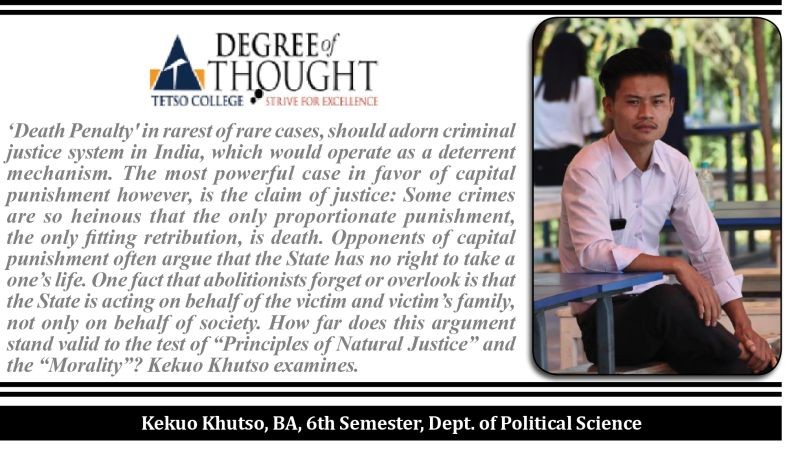
“The State is not God. It has no right to take away that which it cannot give back, if it should so desire.” - Anton Chekhov, The Bet
Through the passing centuries, we have seen the use of death penalty as a means of administering justice. In the world perspective, the first established death penalty laws date as far back as the eighteenth century BC in the code of King Hammurabi of Babylon, which codified the death penalty for twenty five different crimes. The death penalty was also part of the Fourteenth Century BC’s Hittite Code; in the Seventh Century BC’s Draconian Code of Athens, which made death the only punishment for all crimes; and in the Fifth Century BC’s Roman Law of the Twelve Tablets. Very brutal death sentences were carried out by such means as crucifixion, drowning, beating to death, burning alive and impalement. Over time, other forms of death penalty prevailed in the world such as hanging in Britain, guillotining in France, beheading in Middle East countries, execution by electrocution in Russia, etc.
An essay On Crimes and Punishment (1767) by Cesare Beccaria theorised that there was no justification for the state’s taking of a life. This had an especially strong impact throughout the world and it gave abolitionists an authoritative voice and renewed energy. The abolitionist movement gained momentum in the northeast in the 19th century. In 1834, Pennsylvania became the first state to move executions away from the public eye, and in 1846, Michigan became the first state to abolish death penalty for all crimes. Many countries have then abolished capital punishment either in law or in practice. And, since World War II there has been a trend toward abolishing capital punishment. A total of 102 countries have completely abolished it, a further 6 countries have done so for all offences except under special circumstances and 32 more countries have abolished it in practice because they have not used it for at least ten years and are believed to have a policy or established practice against carrying out executions.
Despite many organizations protesting for the abolishment of death penalty, it is still being carried out in different countries. The UN in its Charter of Rights has declared death penalty or capital punishment as a crime against humanity and had also asked its member countries to abolish it. One of the member countries of the UN – India, has still not gotten rid of capital punishment even though the Constitution of India has stated that the government has no right to take the life of any person as per Article 21. Consequently, India’s international stand on the Moratorium on death penalty both at the General Assembly and at the Human Rights Council has always been against the resolution.
The government must take into consideration the negative aspects of sentencing to death and must take steps to delete such provisions relating to death sentence away from the law. The process of death penalty is long and therefore the convicted prisoners undergo both physical as well as mental torture. This causes them to literally beg for death. Such a situation must not be faced by any human being, be it a convict or not. The process should be declared unconstitutional and an offense against human rights. Although actual executions of convicts punished with death penalty are decreasing in number, yet a lot has to be done to fasten the procedure for those waiting on death row and also comply with India’s international commitments.Death penalty is irreversible and the risk of executing an innocent person can never be eliminated. Also, there have been cases where people were executed after being convicted in grossly unfair trials. The claim of some countries who commonly cite the death penalty as a way to deter people from committing crime has been repeatedly discredited, and there is no evidence that the death penalty is any more effective in reducing crime than life imprisonment. The practice is cruel, inhuman and is a degrading punishment, as such it is an offense against humanity.
God has given us life and no state has the right to take it. Death penalty breaches human rights, in particular the right to life and the right to live free from torture or cruel, inhuman or degrading treatment or punishment, both rights which are protected under the universal Declaration of Human Rights, adopted by the UN in 1948. Therefore, death penalty in all cases should be opposed without exception – regardless of who the accused is and the nature or circumstances of the crime, guilt or innocence or method of execution. In the present era with codified laws and awakened conscience death penalty, the sanctioned killing of a person for a crime, should really no longer be an option of punishment.
Degree of Thought is a weekly community column Degree of Thought is a weekly community column initiated by Tetso College in partnership with The Morung Express. Degree of Thoughtwill delve into the social, cultural, political and educational issues around us. The views expressed here do not reflect the opinion of the institution. Tetso College is a NAAC Accredited UGC recognised Commerce and Arts College. The editors are Dr Hewasa Lorin, Dr Aniruddha Babar, Khangpuiliu Pamei, Rinsit Sareo, Meren and Kvulo Lorin. For feedback or comments please email: dot@tetsocollege.org.






